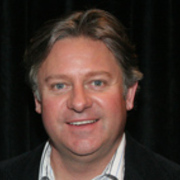
Philip Smith
Philip Smith is a television producer whose wide-ranging roster includes successful reality shows The Lion Man, Rescue 1, and late lamented media satire Eating Media Lunch.
Smith began in television journalism in the early 1990s, after a spell writing for newspapers. He later became producer of current affairs show Holmes.
Smith arranged a meeting with then TVNZ executive Mike Lattin, regarding his plan to go solo and make his own programmes. Smith claims that Lattin offered him the rights to a golfing show for one dollar.
In 1995, Smith set up the sports production company Uplink with longtime sports presenter Phil Leishman. The Golf Show won interest from Sky Television, and became the first of many Uplink shows to sell successfully overseas. Five years later Uplink sold to England's Sportsworld Media in a multi-million dollar deal.
In 2002, Smith and businessman David Levene set up Great Southern, now renamed Great Southern Film and Television. Smith is Managing Director.
The company's original flagship show was post-modern media show Eating Media Lunch, presented by Jeremy Wells. Meanwhile Great Southern found international success with multiple seasons of The Lion Man, following the work of animal park owner Craig Busch. The Lion Man has sold to more than 100 countries.
Having played a hand in creating both Eating Media Lunch and political mockumentary The Pretender, Smith considers himself part ideas man, and part salesman. His trips to international trade fairs have seen a number of overseas sales, along with format rights for other countries to create their own local versions.
In late 2006, Smith predicted both opportunities and tougher times ahead for television producers, thanks partly to media fragmentation and the growth of online viewing options. Queenstown-based Smith has cited the importance of making a diverse range of shows, to protect Great Southern against the inevitable drops in popularity of some genres.
Producer and former Great Southern contractor Rachel Gardner joined the board in 2008, signaling the company's growing interest in drama. A few months later, Great Southern's first feature film Apron Strings won invitation to the Toronto film festival. Both Apron Strings and Great Southern's Show of Hands (produced by Angela Littlejohn) began life under Littlejohn's/Gardner's old company Maxim Films.
The rapidly expanding slate of television shows made by Great Southern includes game show The Singing Bee, Back of the Y, the Jeremy Wells presented The Unauthorised History of New Zealand, reality show Shearing Gang, and Kiwi versions of The Apprentice and Who Wants to be a Millionaire. In 2013 Great Southern show Coast Australia, based on an English format, became one of the highest-rating documentary series on subscription television in Australia. It also sold to the BBC.
Four years before that, the company produced its first television drama, the twist-filled The Cult (which was later remade for Russian audiences). The same year Great Southern shows and feature films secured 20 nominations in the Qantas Film and Television Awards, including scoring two of the three finalists spots in Best Feature Film, Best Comedy and Best Light Entertainment. Next came two seasons of Robyn Malcolm comedy drama Agent Anna, and Moa-nominated telemovie The Kick, inspired by a live or die kick during the final of the 2011 World Cup.
Sources include
Great Southern Film and Television website. Accessed 20 November 2014
Deborah Hill Cone, 'The New Boys on the Box' - Idealog, November 2006, Page 36
Suzanne McFadden, 'One to watch' (Interview) - Unlimited, 30 June 2008